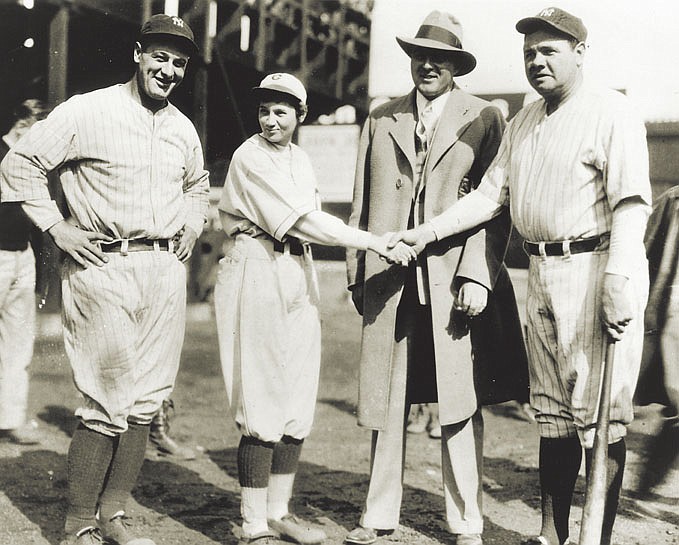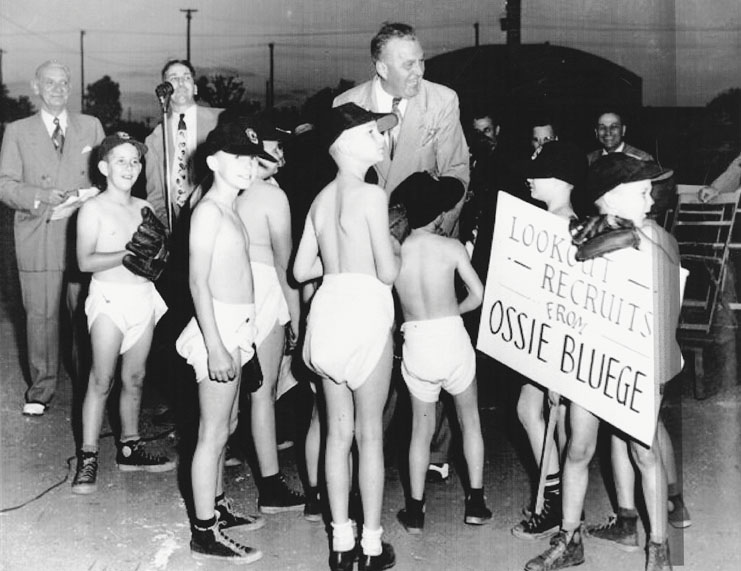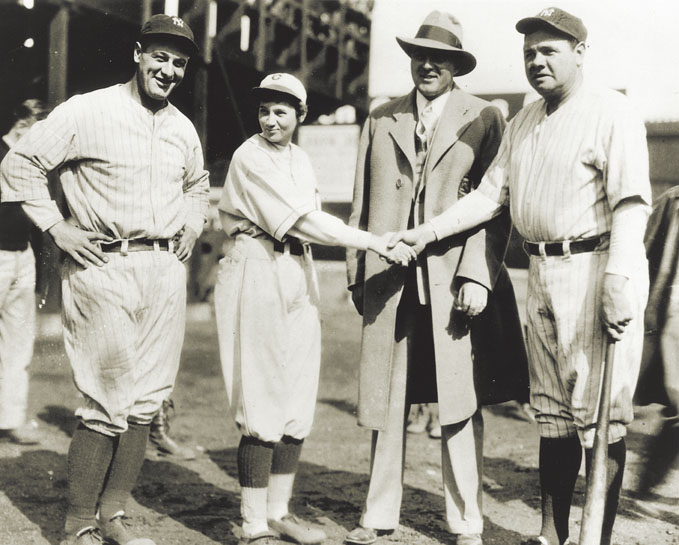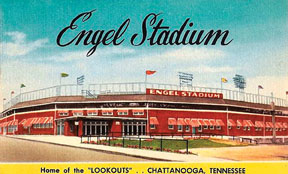"It was the one place in Chattanooga where people could go and always leave happy," Buck Johnson says of Engel Stadium, his boyhood destination of choice while growing up in the post-Depression era. He and his friends would regularly hitchhike from Soddy to Market Street, where they would begin the trek to Engel Stadium on foot to see the Lookouts play. It was of little importance to them whether the team won or lost - their pleasure came from the full experience of Engel Stadium that no other Chattanooga attraction could provide: the energy of being outside with thousands of fans, the crack of the bat, the expanse of green grass and their own hometown heroes on the diamond.
Radiating with Joe Engel's legendary showmanship, humor and generosity, the stadium offered hope during a difficult time for many. Fans could not only lay eyes on their heroes; they saw the potential to become heroes themselves. Chattanooga was a hot spot for baseball at that time. Playing for the Lookouts was a stepping stone to the major leagues for players now included in baseball's Hall of Fame, and many big-time players would stop to play exhibition games in the Scenic City on their way north from spring training.
"Being on that field, you felt like you were in the major leagues," says Johnson, who was among the thousands of Chattanoogans to participate in Joe Engel's Knothole Gang from the 1930s to the 1960s.
Playing or watching baseball was the primary form of entertainment during that time. Instead of full uniforms, the players wore matching T-shirts with jeans or overalls.
"We were coming out of the Great Depression and none of us had anything," says Johnson.
Meeting the requirements of good grades and regular Sunday school attendance, Johnson acquired his first Knothole Gang membership card in 1939. For Knothole Gang members, the baseball diamond served as an arena to learn life's most important lessons, from self-discipline to accepting defeat. Many former members now hold positions of leadership in the city, and others, including Johnson, served as coaches and life mentors to the next generation of players. "We learned a lot about life just playing ball," says Johnson, citing good sportsmanship and the ability to work as a team. "It put us on the right track to becoming decent adults. If we got out of line, they put us back in line."
By 1954, Joe Engel's Knothole Gang had grown to 6,595 players participating in 19 leagues, with 82 white and 18 black teams representing 93 schools. One benefit of membership to players was free admission to certain games with a paying adult. This gave players a chance to spend quality time with their fathers, as well as increasing ticket and concession sales at Engel Stadium. "I always looked forward to Knothole Night," says Johnson of the one night of the year Joe Engel devoted to his Knothole Gang, when all players and coaches received recognition and free admission. He recalls how he and the other players would parade around the stadium in their team shirts, forming rows four or five players deep around the edge of the outfield.
The stadium also hosted the Knothole Gang's end-of-season tournament, giving players a taste of the big time. The opportunity to play or even just stand on the same field as baseball greats such as Babe Ruth, Lou Gehrig and Jackie Robinson in Engel Stadium is still remembered by many as a childhood highlight.
Knothole: Next Generation
A younger generation will have a chance to experience the magic of retracing the steps of baseball heroes as the Knothole Gang reunites for an open house event at Engel Stadium Oct. 18. "I think we have a common bond: a love of baseball and wanting to see the young kids regain that interest," says Ed Ingle, part of a group of former Knothole Gang members and local baseball enthusiasts organizing the reunion who refer to themselves as the Friends of Engel Stadium. Along with Johnson and Ingle, organizers also include local historian and urologist Dr. Smith Murray, psychotherapist Bud Ragan, former sportswriter Ray Deering and sportscaster Gary Haskew.
Knothole Gang Open House
Engel Stadium will open its doors to former members of Joe Engel's Knothole Gang and others interested in the historic building's revitalization for a reunion and open house event Thursday, Oct. 18 at 6 p.m. To find out more about the Knothole Gang reunion, visit friendsofengel.org. To follow the progress of the revitalization of Engel Stadium, see engelfoundation.com.
"Everybody was in the gang," recalls Deering, who played for Sunnyside from 1953-1956. His memory of playing on the Engel Stadium field as an eighth-grader during the Knothole Gang's end-of-season tournament still stands out in his mind. "I got two singles in the game at Engel. It was the highlight of my baseball career."
Ragan played on the Sunnyside Golds with Deering and several other prominent Chattanoogans, such as Dr. Ron Cox, dean of UTC's engineering school. Other team members have continued to make positive contributions to society working as contractors, insurance salesmen and top executives at large corporations. "It was an awful lot of fun for me as a kid. It was just a great team experience," says Ragan. "I think it's interesting that everyone on the team went on to make something of themselves."
The Knothole team tradition of simply wearing matching T-shirts for uniforms continued into the last days of the program, according to Buck Schimpf, a member of the Signal Mountain team from the late 1950s to early 1960s. "It was pure sandlot baseball," he says of the Knothole program, of which his fondest memories are the friendships formed with players from across the city. Having trophies presented by Joe Engel at the end of the season was also a treat.
"It was a wonderful experience that exposed you to big-time baseball," says Ragan, who remembers as a Knothole member meeting Roy Hawes, first baseman for the Lookouts when the team won the Southern pennant in 1952. "It was a tremendous moment for me, because he was my hero," says Ragan of Hawes, who is rumored to be among those attending the Knothole reunion.
A Knothole player on the Avondale Grammar School team from 1939-1941, Ingle says he hopes to catch up with other players from that era who are now in their 70s and 80s at the reunion. The Oct. 18 event is also seen by organizers as a way to renew interest in Engel Stadium. "We want anyone who's interested in the stadium to come, because the two [Engel Stadium and the Knothole Gang] were inseparable from our perspective," says Deering. "We hope those who come bring their kids and grandkids."
Haskew will serve as master of ceremonies for the reunion event, which begins with a social hour at 6 p.m. Hot dogs, Cokes and Moon Pies will be served as attendees take in a multimedia presentation prepared by Brian Wright, a UTC senior and secretary of the Engel Stadium Foundation who chose the facility as the focus of his senior project at Chattanooga School for the Arts and Sciences. "I don't think there could be a better event to involve the whole community," he says of the Knothole reunion, which he hopes will not only conjure up memories for one-time members, but also reignite the spirit of baseball during Engel Stadium's heyday for kids today.
If one sits near the stadium for just ten minutes, it would be unusual to not see at least one person stop to take a photo, he remarks. "I think it's an amazing thing people come by and take pictures of a stadium that hasn't been played in for 13 years. I think this will be the first event of many."
Also speaking at the event is Janna Jahn, who is leading the stadium revitalization effort as chair of Engel Stadium Foundation. Excitement around the stadium began to build with the filming of the movie "42," and parties interested in the stadium's development are using the film as a catalyst to put the stadium back into the forefront of local minds. "There's a lot of nostalgia in it," says Ingle of the historic stadium. "The grandstands look beautiful. I'd like to see it return to the glory times."
Engel Stadium Re-imagined
Janna Jahn says a task force composed of 15-20 community leaders plans to take a broad, creative look at other ways Engel Stadium could be used. Included on the force are members of stakeholder institutions including University of Tennessee at Chattanooga, which currently owns the stadium and signed a four-year lease with the Engel Stadium Foundation in March 2012. Erlanger Hospital, Engel Stadium Foundation, the city of Chattanooga and the Hamilton County Regional Planning Agency as well as residents from surrounding neighborhoods are also represented on the task force, which will begin its official study within the next 60 days.
"I think the neighborhood has a special heart for the historical nature of the stadium," says Carla Pritchard, one of two representatives on the task force from the Fort Wood neighborhood, itself steeped in local history. "We want to see the preservation of the stadium as an important part of where Chattanooga is and where we're going. I'm grateful that they are including the neighborhoods - not just ours - around that area to be a part of the planning process. That's going to be so important to get that feedback Chattanooga is known for."
Task force member Pem Guerry, who served as head of the River City Company during the height of the revitalization of the city's Southside, names the Walnut Street Bridge as another example of the city's ability to repurpose a landmark of historical value and turn it into a new attraction.
"Something Chattanooga does really well is to choose a project that makes sense and then rally around that project," he says. "Chattanooga is not one to throw aside its historical aspects. Engel Stadium is a facility with a tremendous historical background that many, if not most, Chattanoogans understand."
Jahn says she would like to begin a community visioning process in October followed by a rapid design session in November. "We want to make absolutely certain we don't leave any key people out, so we don't know today what the exact process will be," says Guerry. "I personally feel there are a lot of progressive opportunities and alternatives within the stadium itself that will be exciting for the neighborhood to pursue and will revitalize that area," says Pritchard, also head of Chattanooga Presents, which brings downtown to life Friday evenings during the summer months with the Nightfall concert series. She says Chattanooga Presents is considering Engel Stadium as a venue for future events.
"We're inspired by the space and the potential it has in terms of offering some programming in the community that's not already occurring that's specific to that space to enhance its unique personality."
Engel Stadium's selection as one of 30 projects to be undertaken throughout the city for the United Way's recent Day of Caring shows the importance the community attaches to the revitalization effort, as does the Cornerstone Foundation's agreement to give proceeds from Wine Over Water ticket sales to the Engel Stadium Foundation.
The task force is currently discussing ideas that fit into that scenario - such as turning the field into an iceskating rink as the weather cools - but the group must have adequate funding in place before any of the ideas come to fruition. "It can be a variety of things to a variety of people," says Jahn, who was inspired to start the Engel Stadium Foundation in 2009 after learning the story of Jackie Mitchell. Mitchell, a 17-year-old female, struck out both Babe Ruth and Lou Gehrig during an exhibition game held at the stadium in 1931. Engel attempted to sign her to the Lookouts, which caused great controversy in the world of baseball.
"I would love for Engel to re-find its place in the community," says Jahn. "Baseball will always be a part of the picture, but I feel it will take more than baseball alone to make it thrive." Holding a showing of the movie "42" at the stadium is one idea she hopes will come to pass. The Lookouts could also play a "retro game" during their regular season at Engel wearing uniforms from the 1930s-1940s era. Other possibilities discussed include using the field for other sports such as softball or as a multipurpose venue for concerts, fundraisers and community events. She says she hopes to retrieve some of the items from Joe Engel's office from the Baseball Hall of Fame in an effort to capture more of the rich history of the stadium and its namesake in the revitalized venue.
The foundation will hold its fourth annual baseball clinic for local youth at McCallie School this month. Led by Rick Honeycutt, pitching coach for the Los Angeles Dodgers, with guest appearances by minor league players, the clinic gives participants a chance to learn from the pros, says Lady Walker, a two-year board member of the foundation. The stadium could also serve as home base for a new little league program started recently by the city of Chattanooga's Parks and Recreation department referred to as the RBI (Reviving Baseball in the Inner city) program. "It would be nice to have that continuity," says Walker of the revamped version of the Knothole Gang. "Baseball is still important to kids, and the values it instills are still important to all of us."
Protecting a Legacy
"He was one of those larger than life fixtures," remembers former Lookouts owner Carrington Montague of Joe Engel, whose hand he shook as an 8-year-old attending games with his father and uncle.
Engel, often referred to as the "Barnum of Baseball," had a knack for showmanship. His many antics included selling a player for a turkey, "scalping" a player of Native American descent by shaving his head in a teepee on the field (a stunt he called "Custer's Revenge") and giving away a fully furnished home in Rivermont, still standing just off Hixson Pike at 1 Rivermont Road.
"Joe Engel was such a fabulous character," says local historian and Friends of Engel Stadium member Dr. Smith Murray. "If Engel Stadium goes, his legacy will be lost. It's not just the stadium but the man himself we'd like to preserve."
Buck Schimpf recalls hunting at Engel's farm with his father, who along with Engel was of German descent. The two met while Schimpf's father was the starting pitcher at McCallie School and became friends, sharing in the hobby of pigeon racing. He says the farm's entrance was marked with brick columns topped with concrete baseballs 2-3 feet in diameter, which remain minus their sporty paint near what is now Council Fire golf course in East Brainerd.



